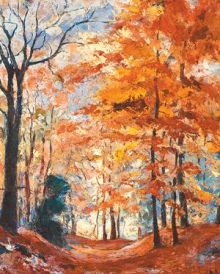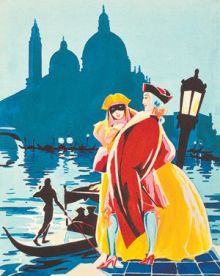Oleksandr Savchenko-Bilsky, born in Chernihiv region, in 1922 found himself in Paris caught by a vortex of the events of the civil war and lived there till his death in 1991.
He came to Ukraine only once as a tourist in 1983.
The artists entrusted to pass the major part of his drawings to Ukraine.
However, they arrived in the painter’s homeland many years after his death. His daughter Irene Godiyo who opened in 2003 the numerous canvases of her father for the Ukrainian public made an important contribution to it.
Oleksandr Savchenko-Bilsky and his works are depicted in the book The Ukrainian Artists of Paris. 1900-1939 by Vita Susak (Rodovid, 2010).
This is the first work presenting the activity of the Ukrainian artists within the Paris School in full.
There was the so-called Ukrainian Paris Group within the Paris School.
It wasn’t a formal union, society or a circle.
“The artists just gathered at times in a cafe or in someone’s studio for a cup of coffee and chatted,” the book quotes the explanations of one of the group members Sviatoslav Hordynsky, “that group was very heterogeneous and mixed rather from the political point than from creative one.”
The Ukrainian Paris Group comprised such artists of the Ukrainian origin as Oleksa Hryshchenko, Vasyl Khmeliuk, Mykola Vaker, Borys Pastukhov, Mykhailo Andriienko and others.
The works of the group members were regularly exhibited, in particular, at the French-Ukrainian exhibit held in Paris in 1932 and in the Lviv National Museum on February 26, 1933.
The exhibits of the Ukrainian artists were not as large as the ones of their Russian or Polish colleagues.
However, most importantly, they contributed to the national consolidation of the Ukrainians abroad since the word “Ukrainian” always appeared in the names of those presentations.
Savchenko-Bilsky’s creative heritage comprises the works of various genres. The painter mostly worked with applied graphic art and advertising – he created holiday cards, illustrations for books and magazines for the French press. He designed shopwindows, tableware, furniture, ornament patterns for leather stamping and interiors. Sometimes he painted oil and pastel landscapes, portraits and still life with flowers in the Post-Impressionist and Realist manner. He also depicted hetmans, writers and politicians ordered by the Ukrainian publishers and illustrated the scout’s magazine Skob issued in Paris in 1937-1940.
His works differed by the simplicity and decorativeness of forms in the spirit of Art Deco and the fashion of 1930s. However, he followed simultaneously the traditions of the Ukrainian folk painting.
The iconography takes an important place in Savchenko-Bilsky’s creative work apart from his secular works.
He created two icon-screens for the Ukrainian catholic and orthodox churches of Paris. One of them is now in the Ukrainian St. Sergius and Bacchus Cathedral and in the Zhyrovytska Virgin Cathedral in Rome.








